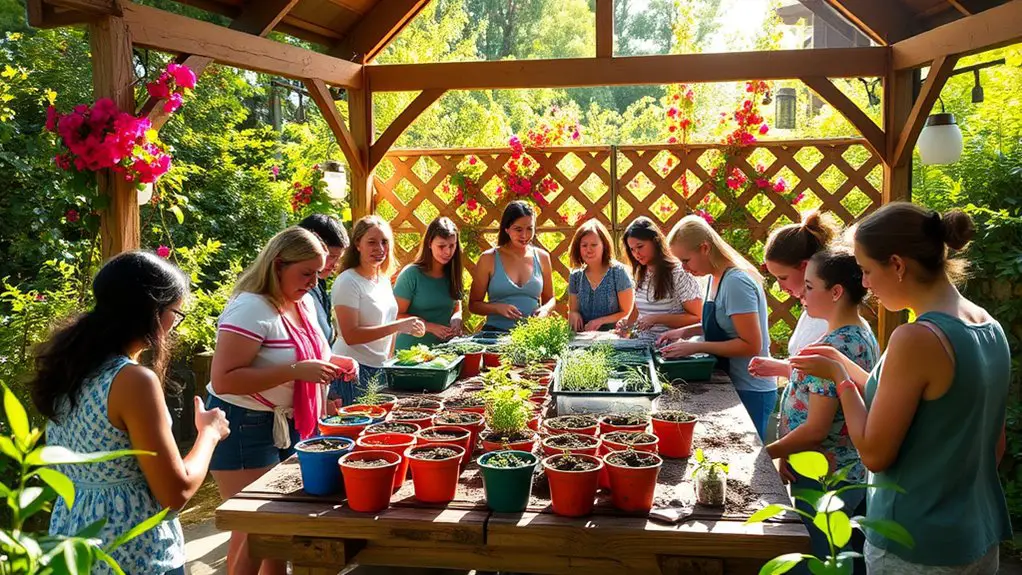Hosting a gardening workshop in your gazebo can be a fantastic way to engage your community. Start by choosing a relevant topic that resonates with your audience, like organic or container gardening. Set the scene by cleaning and decorating your gazebo to create an inviting atmosphere. Gather essential tools and supplies for hands-on activities. Promote your event through social media and local outreach. With effective teaching techniques and a focus on community building, you’ll foster a love for gardening. Discover more ways to enhance your workshop!
Choosing the Right Topic for Your Workshop
How do you decide on the perfect topic for your gardening workshop? Start by considering your audience’s interests and needs. Think about relevant topics that resonate with them, whether it’s organic gardening, container gardening, or native plants. Next, focus on plant selection. What plants thrive in your region? Highlighting local flora not only engages participants but also empowers them to make informed choices. Additionally, consider incorporating information about climbing plants that can enhance outdoor structures like gazebos, as they provide both aesthetic appeal and practical benefits.
Setting the Scene: Preparing Your Gazebo
To create the perfect atmosphere for your gardening workshop, start by cleaning and organizing your gazebo space. A tidy area not only enhances focus but also makes a great impression on your guests. Consider adding some decorative touches, like potted plants or cheerful banners, to inspire creativity and set a welcoming tone. Additionally, ensure that your gazebo has been properly maintained and inspected to provide a safe and enjoyable environment for all participants.
Clean and Organize Space
As you prepare your gazebo for a gardening workshop, it’s essential to create a clean and organized space that inspires creativity and productivity. Start with a thorough cleaning checklist—sweep the floors, wipe down surfaces, and clear out any clutter. This not only makes the space inviting but also guarantees safety for all participants. Once you’ve cleaned, it’s time to focus on organizing supplies. Group tools, pots, and seeds by type or function, making them easily accessible. Consider using baskets or shelves to keep everything in its place. An organized space allows you to flow freely, so you can concentrate on sharing your gardening knowledge. Remember, a tidy environment fosters a positive atmosphere for learning and collaboration.
Add Decorative Touches
With your gazebo now clean and organized, it’s time to add some decorative touches that will enhance the workshop’s atmosphere. Start by incorporating decorative plants around the space to bring life and color. Consider themed decorations that align with your gardening focus, such as nature-inspired art or seasonal accents. Ambiance lighting, like string lights or lanterns, can create a warm, inviting feel as dusk approaches. Don’t forget colorful signage to guide attendees and add a playful element. For table centerpieces, use small pots with herbs or flowers that participants can take home. Finally, encourage creativity with DIY crafts that complement your theme, allowing guests to leave with something unique and personal.
Essential Supplies and Tools for Participants
To make your gardening workshop a success, you’ll need a few essential supplies and tools. Think about must-have items like trowels, pruning shears, and gloves, along with planting supplies such as seeds, soil, and pots. Gathering these essentials will guarantee you and your participants are well-prepared to get hands-on in the garden!
Must-Have Gardening Tools
Whether you’re a seasoned gardener or just starting out, having the right tools can make all the difference in your gardening experience. Equip yourself with essential items like pruning shears for shaping plants and a hand trowel for easy digging. A garden fork helps aerate soil, while a garden rake guarantees a tidy space. Don’t forget your garden gloves to protect your hands! A watering can is vital for hydration, and a soil tester lets you know your soil’s health. Use plant labels to keep track of your seedlings, and seed packets to grow new plants. Finally, a compost bin is fantastic for recycling organic waste, enriching your garden. With these tools, you’ll cultivate a thriving garden!
Essential Planting Supplies
As you immerse yourself in the world of gardening, having the right planting supplies can greatly enhance your experience. Start your workshop with essential items that support effective garden planning and design. Here are a few must-haves:
- Soil testing kits: Verify your soil’s health and nutrient levels for peak growth.
- Organic fertilizers: Promote sustainability while providing your plants with the nutrition they need.
- Watering tools: Master watering techniques to keep your garden thriving.
Don’t forget to include resources on seed selection, pest control, composting methods, and plant propagation for a thorough experience. With seasonal planting in mind, equip your participants with the knowledge to nurture their gardens and enjoy the freedom that comes with cultivating their own green spaces.
Inviting Your Community: Promotion Strategies
How can you effectively rally your community for a gardening workshop in your gazebo? Start by leveraging social media platforms to spread the word. Create engaging posts that highlight seasonal themes and encourage sharing. Don’t underestimate the power of word of mouth; chat with neighbors and invite them personally. Consider neighborhood canvassing to reach those who might not be online. Partner with local gardening clubs and businesses to promote your event through their networks. Utilize community bulletins and email newsletters for broader outreach. Design eye-catching event flyers to place in local shops or libraries. Finally, tap into online forums dedicated to gardening enthusiasts—these spaces can help you connect with like-minded individuals enthusiastic to join your workshop!
Structuring the Workshop Agenda
Creating a well-structured agenda for your gardening workshop can make all the difference in ensuring a smooth and engaging experience for participants. Consider the overall workshop duration and leave room for agenda flexibility, allowing you to adapt based on participants’ interests.
- Welcome and Introductions: Kick off with a friendly atmosphere to break the ice.
- Main Topics: Focus on key gardening concepts while keeping discussions open for input and questions.
- Wrap-up and Q&A: End on a high note, encouraging participants to share their thoughts and ask questions.
Hands-On Activities: Engaging Participants
To make your gardening workshop truly memorable, consider setting up interactive planting stations. These hands-on areas allow participants to get their hands dirty while learning about different plants and techniques. You can also incorporate creative garden crafts to spark their imagination and enhance their gardening experience.
Interactive Planting Stations
Four interactive planting stations can transform your gardening workshop into an engaging experience for participants of all skill levels. These hands-on activities not only make learning fun but also encourage teamwork and creativity. Here are some ideas to get you started:
- Plant Identification Challenge: Set up a station where participants identify various plants using picture cards and interactive games.
- Seed Planting Race: Create a friendly competition to see who can plant seeds correctly the fastest, adding excitement and camaraderie.
- Container Gardening: Allow participants to design their own mini pots with soil and plants, giving them a sense of ownership and satisfaction.
These interactive planting stations will inspire your guests and foster a love for gardening!
Creative Garden Crafts
While you explore the joys of gardening, incorporating creative garden crafts can enhance the experience and allow participants to express their artistic sides. Engage your attendees with hands-on activities, using recycled materials to create unique garden art and plant decorations. Here are some ideas to inspire fun and creativity:
| Activity | Materials Needed | Seasonal Theme |
|---|---|---|
| Painted Rock Animals | Rocks, Paint | Spring/Summer |
| Nature Craft Mobiles | Twigs, String, Leaves | Fall |
| Eco-Friendly Planters | Recycled Containers | Year-Round |
These nature crafts can become community projects or delightful children’s activities, fostering a sense of connection and creativity. Encourage eco-friendly crafts, making your workshop both fun and sustainable!
Tips for Effective Teaching and Facilitation
Effective teaching and facilitation can transform your gardening workshop into an engaging experience for everyone involved. To create an atmosphere where participants feel free to explore and learn, consider these tips:
- Diverse Teaching Styles: Incorporate various teaching styles to cater to different learning preferences. This keeps everyone engaged and encourages creativity.
- Facilitation Techniques: Use open-ended questions and group activities. These techniques promote discussion and empower participants to share their insights.
- Effective Communication: Be clear and concise in your instructions. Encourage feedback and guarantee everyone feels heard, fostering a supportive environment.
Creating a Comfortable Environment
Creating a comfortable environment is essential for a successful gardening workshop, as it allows participants to feel relaxed and open to learning. Start by arranging comfortable seating that encourages interaction and movement. Use cushions or blankets to make chairs more inviting, ensuring everyone feels at ease. Next, focus on ambient lighting; soft, warm lights can create a cozy atmosphere, especially if your workshop extends into the evening. You might also consider string lights or lanterns to enhance the natural beauty of your gazebo. Finally, keep the space well-ventilated and consider adding some plants or flowers for an aromatic touch. By prioritizing these elements, you’ll foster a welcoming space where everyone can thrive and enjoy their gardening journey. Additionally, incorporating outdoor lighting options can enhance the overall decor and atmosphere of the workshop.
Follow-Up and Building a Gardening Community
After your gardening workshop wraps up, it’s essential to maintain the connections you’ve established and foster a vibrant gardening community. Implementing effective follow-up strategies will enhance participant engagement and keep the enthusiasm alive. Here are some ideas to contemplate:
- Create a social media group for ongoing communication and resource sharing among participants.
- Form local partnerships with gardening clubs to host joint events and share expertise.
- Encourage regular meetups to cultivate friendships and deepen the gardening knowledge within your community.
Collecting Feedback and Improving Future Workshops
Building a strong gardening community doesn’t end with your workshop; it can be enhanced by gathering feedback from participants. Using participant surveys and feedback forms can help you gauge what worked and what didn’t. Encourage attendees to share their improvement suggestions, as this will provide valuable insights into their experiences. Consider including specific questions in your workshop evaluations to pinpoint areas for growth, such as content clarity or engagement levels. By actively seeking feedback, you’re not only showing that you value their opinions but also paving the way for better future workshops. Remember, each event is an opportunity to learn and evolve, ensuring your workshops remain enjoyable and enriching for everyone involved.
Frequently Asked Questions
What Is the Maximum Number of Participants for a Workshop?
Imagine cramming twenty enthusiastic souls into a tiny space—chaos! Your workshop’s participant capacity should balance comfort and engagement. Ideally, limit it to around ten to guarantee smooth dynamics and meaningful interactions. Freedom thrives in smaller crowds!
How Long Should the Workshop Last?
For ideal participant engagement, a workshop duration of two to three hours is perfect. This timeframe allows you to cover essential topics while keeping energy levels high and participants actively involved without feeling rushed or overwhelmed.
Can I Charge a Fee for Participants?
Yes, you can charge a fee for participants. Consider pricing strategies that reflect value, while also offering participant incentives like discounts or bonuses. This approach not only enhances engagement but also guarantees your workshop’s sustainability.
What if It Rains on the Workshop Day?
If it rains on workshop day, don’t fret! Have alternative venues in mind and guarantee you’re weather prepared. Flexibility can keep your plans intact and let you enjoy the experience, rain or shine.
Are Children Allowed to Attend the Workshop?
Yes, children are welcome! Just make certain there’re child-friendly activities planned and safety precautions in place. It’ll be a fun experience, allowing them to explore nature while learning valuable gardening skills alongside you and others.

